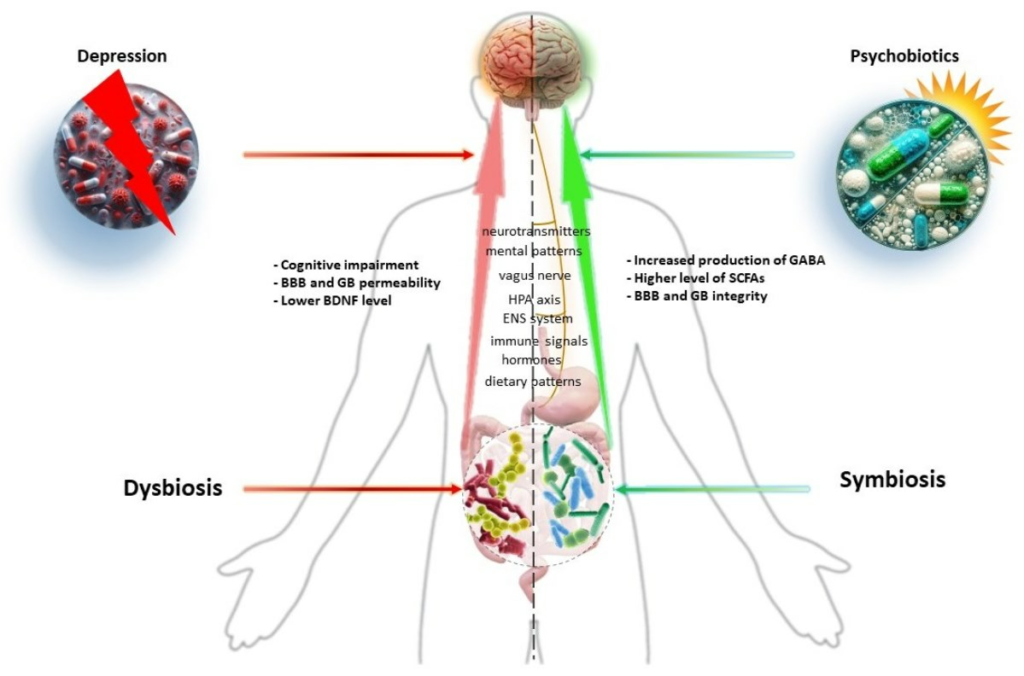
The Gut-Mental Health Connection: How Probiotics Can Alleviate Anxiety and Depression
The Gut-Mental Health Connection: How Probiotics Can Alleviate Anxiety and Depression
Let’s be real—life can get pretty overwhelming. With the pressures of work, relationships, and everyday obligations, it’s normal to feel anxious or a bit down now and then. But here’s something that might surprise you: your gut could be playing a bigger role in your mental health than you think. Recent research sheds light on the fascinating link between our gut microbiome and our feelings, suggesting that boosting our gut health with probiotics may help ease anxiety and depression. Let’s dig into how this all works.
What’s the Gut-Brain Axis?
You might not realize it, but your gut and your brain are in constant conversation. This connection, called the gut-brain axis, enables a sort of communication pipeline between your gut and your brain. Have you ever noticed that stressful situations can give you a stomachache or make you feel a bit queasy? Those aren’t just coincidences; our emotions can directly impact how our stomach feels.
It’s also important to note that not every tummy trouble has a straightforward cause. Many digestive issues are rooted in psychological factors; stress and emotional challenges can stir things up in our digestive systems, creating a cycle that affects both our mental and physical health.
How Gut Microbiota Influences Our Mental Health
Here’s where it gets interesting: our gut is home to a diverse array of microorganisms—these little guys collectively make up our gut microbiota. More and more studies suggest that an imbalance in these microorganisms, known as dysbiosis, can lead to inflammation in the gut, which is linked to mental health struggles like anxiety and depression. Keeping your gut flora balanced isn’t just about physical health; it plays a significant role in how you feel mentally too.
Want to give your gut a boost? Consider adding probiotics to your diet. These beneficial bacteria found in foods like yogurt, kimchi, and sauerkraut could help restore gut health and maybe even lighten your mood.
Probiotics vs. Traditional Treatments
In a world full of medication options, probiotics are stepping into the spotlight. Research is showing that probiotics hold significant promise alongside traditional treatments. For those with functional gastrointestinal issues, therapies that address psychological factors often lead to better outcomes than relying solely on conventional medical treatments.
What’s more, studies have begun to compare the mood-boosting effects of probiotics to traditional antidepressants—and the results are remarkable. In several cases, probiotics not only improved mood but also reduced cortisol, that pesky stress hormone, much like benzodiazepines, which are commonly prescribed for anxiety.
The Evidence Behind This Connection
How Emotions Affect Gut Function
Think about it: when you’re under pressure, say from a looming deadline, it can take a toll on your stomach. Research from Harvard Health indicates that stress can amplify gastrointestinal issues. Understanding this link is crucial for a well-rounded approach to health.
The Connection Between Dysbiosis and Mental Health
The impacts of dysbiosis are profound. Studies show that inflammation stemming from an imbalance in our gut bacteria can contribute to the onset of mental health issues. A healthy microbiome aids in digestion and nutrient absorption while also affecting our mood and cognitive functions. Our gut bacteria play a direct role in producing neurotransmitters like serotonin, often called the ‘feel-good hormone.’
The Benefits of Probiotics
The case for probiotics keeps growing. People who include probiotics in their diets often report not just a better mood but also noticeable changes in their bodies—particularly lower cortisol levels. This serves as a hopeful sign, especially for those who find it tough to respond to traditional medications.
Let’s Get Practical: What You Can Do
Feeling inspired to take action? Here are some straightforward steps to improve your gut health and, by extension, your mental health:
1. Make Some Dietary Changes
– Start by adding fermented foods into your meals. Think yogurt, kefir, sauerkraut, and kimchi—they’re packed with natural probiotics.
– If incorporating these foods isn’t feasible, consider discussing a quality probiotic supplement with a healthcare professional to see what might be right for you.
2. Focus on Managing Stress
– Stress management is key. Try out mindfulness, meditation, or yoga—they can work wonders for your mental clarity and emotional balance.
– And don’t forget about physical activity; regular movement can make a big difference for both your gut and your mental state.
3. Keep an Eye on Your Gut Health
– Pay attention to how your body reacts to different foods and stressors. Keeping a food diary can help you pinpoint gut-friendly options that lift your spirits.
– Be mindful of any symptoms like bloating or irregular bowel movements. If these pop up, have a chat with a healthcare provider about what you’re experiencing.
Wrapping It Up
The connection between gut health and mental well-being is not just a passing trend; it’s a promising area of research that could reshape how we approach anxiety and depression. By understanding the gut-brain axis and incorporating probiotics into our daily routines, we might see some significant shifts in our mental health. Remember to consult with healthcare professionals when making adjustments to your health plan.
You don’t have to make sweeping changes overnight. Start small—add a probiotic-rich food to your plate today, and you’ll be on your way to nurturing that important gut-brain connection.
Have you noticed a mood shift after changing your diet? We’d love to hear your experiences in the comments below, and check out our other articles on mental health and nutrition while you’re here!
Written by Alexander Babinets
Founder of Express Fitness, certified coach, and author helping people get in shape without excuses.
📍 expressfitness.ca | 📩 info@expressfitness.ca
👤 More about me → alexanderbabinets.com
Hashtags: #health #mental #probiotics #connection #brain #mood #anxiety #what #make #stress #these #like #depression #feel #here
